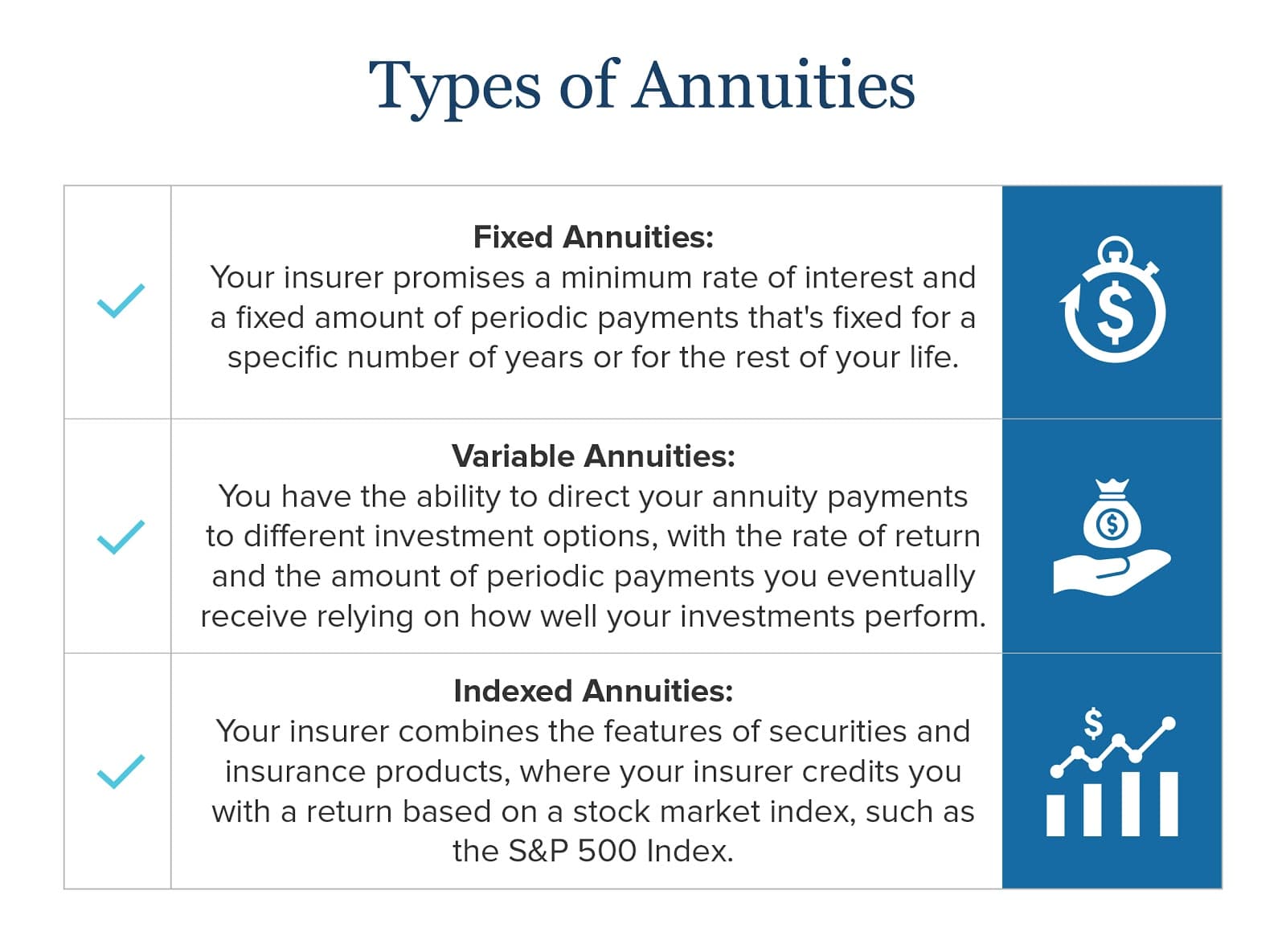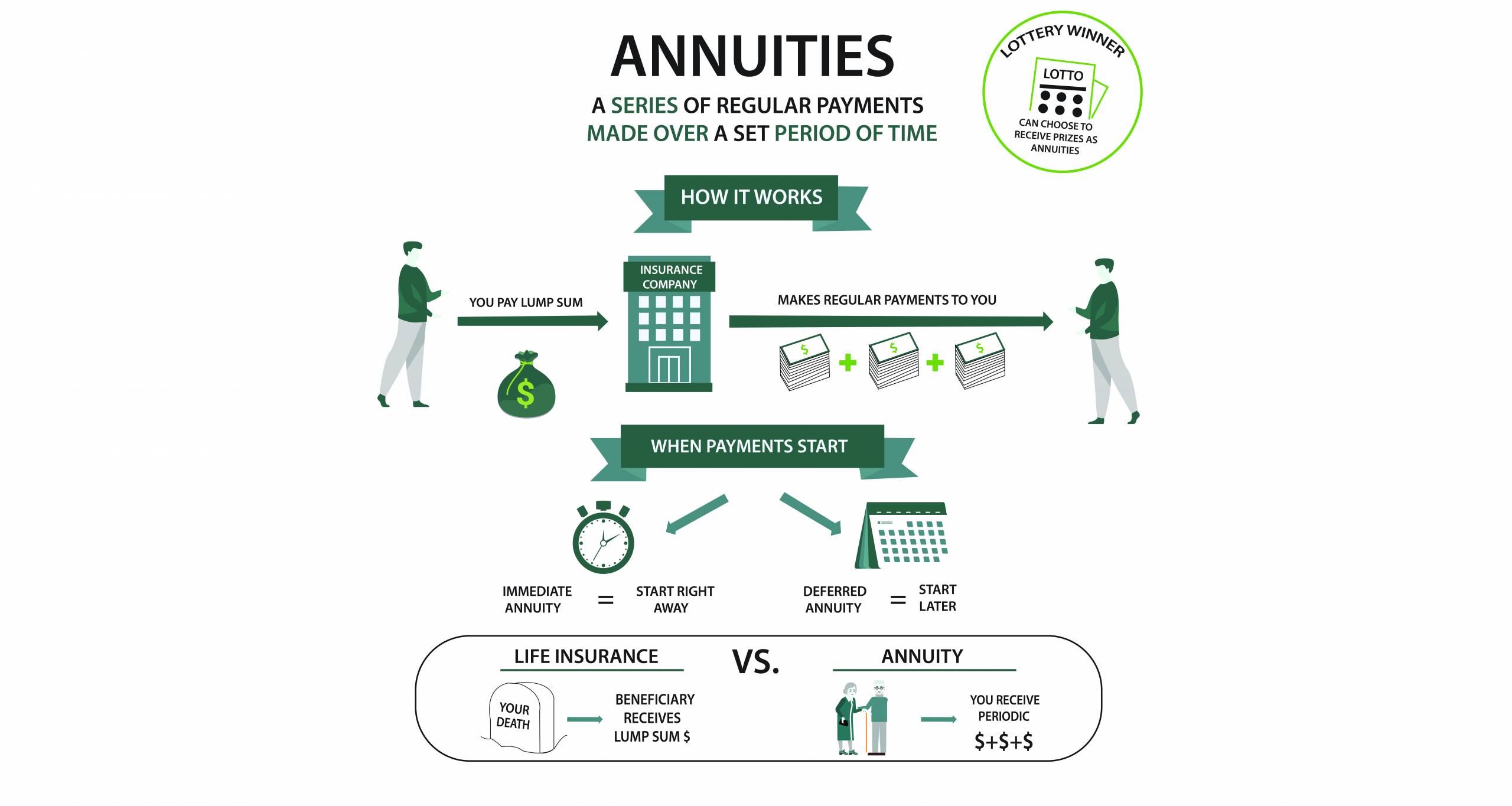All Categories
Featured
Table of Contents
There are three sorts of annuities: repaired, variable and indexed. With a dealt with annuity, the insurer guarantees both the price of return (the rates of interest) and the payment to the financier. The rates of interest on a repaired annuity can transform with time. Frequently the interest price is taken care of for a number of years and afterwards adjustments periodically based upon current prices.
With a deferred set annuity, the insurance provider accepts pay you no much less than a defined price of rate of interest as your account is growing. With an immediate fixed annuityor when you "annuitize" your deferred annuityyou get a predetermined fixed quantity of money, normally on a regular monthly basis (comparable to a pension).
While a variable annuity has the advantage of tax-deferred development, its annual expenditures are most likely to be much greater than the costs of a typical common fund. And, unlike a fixed annuity, variable annuities do not supply any warranty that you'll earn a return on your financial investment. Instead, there's a risk that you could really shed cash.
Decoding How Investment Plans Work A Comprehensive Guide to Fixed Vs Variable Annuity Pros And Cons What Is the Best Retirement Option? Pros and Cons of Various Financial Options Why Variable Annuities Vs Fixed Annuities Can Impact Your Future How to Compare Different Investment Plans: A Complete Overview Key Differences Between Different Financial Strategies Understanding the Rewards of Fixed Annuity Vs Equity-linked Variable Annuity Who Should Consider Fixed Annuity Vs Equity-linked Variable Annuity? Tips for Choosing the Best Investment Strategy FAQs About Variable Annuity Vs Fixed Indexed Annuity Common Mistakes to Avoid When Planning Your Retirement Financial Planning Simplified: Understanding Your Options A Beginner’s Guide to Smart Investment Decisions A Closer Look at How to Build a Retirement Plan
Due to the intricacy of variable annuities, they're a leading resource of financier grievances to FINRA. Prior to buying a variable annuity, carefully reviewed the annuity's syllabus, and ask the person selling the annuity to describe all of the item's functions, riders, expenses and limitations. You need to additionally know exactly how your broker is being made up, consisting of whether they're obtaining a compensation and, if so, exactly how a lot.
Indexed annuities are complicated monetary instruments that have characteristics of both taken care of and variable annuities. Indexed annuities generally offer a minimal surefire rate of interest combined with a rates of interest linked to a market index. Numerous indexed annuities are linked to broad, widely known indexes like the S&P 500 Index. Some use various other indexes, including those that represent various other segments of the market.
Recognizing the attributes of an indexed annuity can be confusing. There are a number of indexing methods companies make use of to determine gains and, as a result of the range and complexity of the approaches used to credit score passion, it's difficult to compare one indexed annuity to an additional. Indexed annuities are generally classified as one of the complying with 2 types: EIAs provide a guaranteed minimum rates of interest (commonly at the very least 87.5 percent of the premium paid at 1 to 3 percent interest), in addition to an additional rates of interest linked to the efficiency of one or even more market index.

Traditional financiers that value security and stability. Those nearing retired life who want to shelter their possessions from the volatility of the stock or bond market. With variable annuities, you can invest in a variety of safety and securities including stock and bond funds. Stock exchange performance determines the annuity's worth and the return you will obtain from the cash you invest.
Comfortable with fluctuations in the securities market and want your investments to keep rate with rising cost of living over a lengthy period of time. Young and wish to prepare monetarily for retirement by gaining the gains in the stock or bond market over the long term.
As you're developing your retired life financial savings, there are several ways to stretch your money. can be specifically valuable savings devices because they ensure a revenue quantity for either a set amount of time or for the rest of your life. Fixed and variable annuities are 2 options that supply tax-deferred growth on your contributionsthough they do it in various methods.
Analyzing Variable Annuity Vs Fixed Indexed Annuity Key Insights on Pros And Cons Of Fixed Annuity And Variable Annuity Breaking Down the Basics of Investment Plans Advantages and Disadvantages of Deferred Annuity Vs Variable Annuity Why Annuity Fixed Vs Variable Is Worth Considering Fixed Interest Annuity Vs Variable Investment Annuity: How It Works Key Differences Between Different Financial Strategies Understanding the Rewards of Long-Term Investments Who Should Consider Fixed Vs Variable Annuity? Tips for Choosing Pros And Cons Of Fixed Annuity And Variable Annuity FAQs About Planning Your Financial Future Common Mistakes to Avoid When Choosing Retirement Income Fixed Vs Variable Annuity Financial Planning Simplified: Understanding Your Options A Beginner’s Guide to Smart Investment Decisions A Closer Look at Annuities Fixed Vs Variable
variable annuity or both as you outline out your retired life earnings strategy. An offers a guaranteed passion rate. It's taken into consideration a conservative item, supplying a modest earnings that are not tied to market performance. Your contract value will certainly raise because of the accrual of assured passion incomes, indicating it won't shed value if the market experiences losses.
A consists of bought the stock exchange. Your variable annuity's financial investment performance will influence the size of your nest egg. It may ensure you'll obtain a series of payouts that begin when you retire and can last the rest of your life, offered you annuitize (start taking settlements). When you start taking annuity repayments, they will certainly depend upon the annuity worth during that time.
Market losses likely will cause smaller payouts. Any interest or various other gains in either type of contract are sheltered from current-year taxes; your tax liability will come when withdrawals begin. Let's check out the core attributes of these annuities so you can choose just how one or both might fit with your overall retirement approach.

A fixed annuity's worth will not decline due to market lossesit's regular and steady. On the various other hand, variable annuity values will change with the performance of the subaccounts you choose as the marketplaces fluctuate. Incomes on your fixed annuity will highly rely on its acquired rate when bought.
Conversely, payment on a dealt with annuity bought when rate of interest are reduced are most likely to pay out profits at a reduced price. If the rate of interest is ensured for the size of the agreement, incomes will certainly stay constant no matter of the markets or rate task. A set price does not indicate that taken care of annuities are risk-free.
While you can't arrive at a fixed price with a variable annuity, you can select to buy traditional or aggressive funds customized to your danger level. More conventional investment options, such as short-term mutual fund, can help lower volatility in your account. Given that taken care of annuities use an established rate, dependent upon existing rates of interest, they do not use that exact same flexibility.
Exploring Fixed Index Annuity Vs Variable Annuity A Comprehensive Guide to Investment Choices Defining the Right Financial Strategy Features of Fixed Annuity Or Variable Annuity Why Choosing the Right Financial Strategy Is Worth Considering Variable Annuity Vs Fixed Annuity: Explained in Detail Key Differences Between Different Financial Strategies Understanding the Rewards of Immediate Fixed Annuity Vs Variable Annuity Who Should Consider Strategic Financial Planning? Tips for Choosing Fixed Vs Variable Annuity Pros And Cons FAQs About Fixed Income Annuity Vs Variable Growth Annuity Common Mistakes to Avoid When Planning Your Retirement Financial Planning Simplified: Understanding Pros And Cons Of Fixed Annuity And Variable Annuity A Beginner’s Guide to Smart Investment Decisions A Closer Look at How to Build a Retirement Plan

Of the its ensured growth from accrued rate of interest repayments sticks out. Repaired rates of interest use small growth in exchange for their assured incomes. You potentially might gain more long-term by taking additional danger with a variable annuity, but you can additionally shed cash. While fixed annuity agreements stay clear of market danger, their trade-off is less growth potential.
Investing your variable annuity in equity funds will certainly offer more prospective for gains. The costs related to variable annuities might be greater than for other annuities. Investment options, fatality advantages, and optional advantage assurances that may grow your possessions, additionally add expense. It's vital to review features and connected costs to make certain that you're not spending greater than you need to.
The insurance policy firm may enforce surrender fees, and the Internal revenue service might levy a very early withdrawal tax obligation fine. They start at a certain percent and then decrease over time.
Annuity incomes are subject to a 10% very early withdrawal tax obligation fine if taken prior to you get to age 59 unless an exemption uses. This is imposed by the IRS and puts on all annuities. Both dealt with and variable annuities offer alternatives for annuitizing your equilibrium and transforming it into an assured stream of lifetime revenue.
Highlighting Indexed Annuity Vs Fixed Annuity Key Insights on Your Financial Future Breaking Down the Basics of Fixed Vs Variable Annuities Advantages and Disadvantages of Different Retirement Plans Why Choosing the Right Financial Strategy Can Impact Your Future How to Compare Different Investment Plans: How It Works Key Differences Between Variable Annuity Vs Fixed Indexed Annuity Understanding the Key Features of Annuity Fixed Vs Variable Who Should Consider Strategic Financial Planning? Tips for Choosing Fixed Vs Variable Annuity FAQs About Fixed Annuity Vs Equity-linked Variable Annuity Common Mistakes to Avoid When Choosing Fixed Index Annuity Vs Variable Annuities Financial Planning Simplified: Understanding Your Options A Beginner’s Guide to Smart Investment Decisions A Closer Look at How to Build a Retirement Plan
You might make a decision to utilize both dealt with and variable annuities. Yet if you're picking one over the various other, the differences issue: A may be a far better alternative than a variable annuity if you have a much more conventional threat resistance and you look for foreseeable rate of interest and primary defense. A might be a better alternative if you have a greater danger tolerance and want the potential for long-lasting market-based growth.
Annuities are agreements offered by insurance coverage business that assure the customer a future payout in regular installations, normally monthly and commonly permanently. There are various types of annuities that are designed to serve different functions. Returns can be taken care of or variable, and payments can be prompt or delayed. A fixed annuity warranties payment of a collection amount for the term of the arrangement.
A variable annuity fluctuates based on the returns on the common funds it is invested in. An immediate annuity begins paying out as quickly as the customer makes a lump-sum repayment to the insurer.
Annuities' returns can be either dealt with or variable. With a dealt with annuity, the insurance firm ensures the buyer a particular payment at some future day.
Table of Contents
Latest Posts
Understanding Fixed Vs Variable Annuity Everything You Need to Know About Financial Strategies Defining the Right Financial Strategy Benefits of Choosing Between Fixed Annuity And Variable Annuity Why
Exploring Variable Annuity Vs Fixed Annuity A Closer Look at Fixed Annuity Vs Equity-linked Variable Annuity Defining the Right Financial Strategy Features of Smart Investment Choices Why What Is Vari
Highlighting Annuity Fixed Vs Variable Key Insights on Fixed Indexed Annuity Vs Market-variable Annuity What Is the Best Retirement Option? Features of Fixed Indexed Annuity Vs Market-variable Annuity
More
Latest Posts